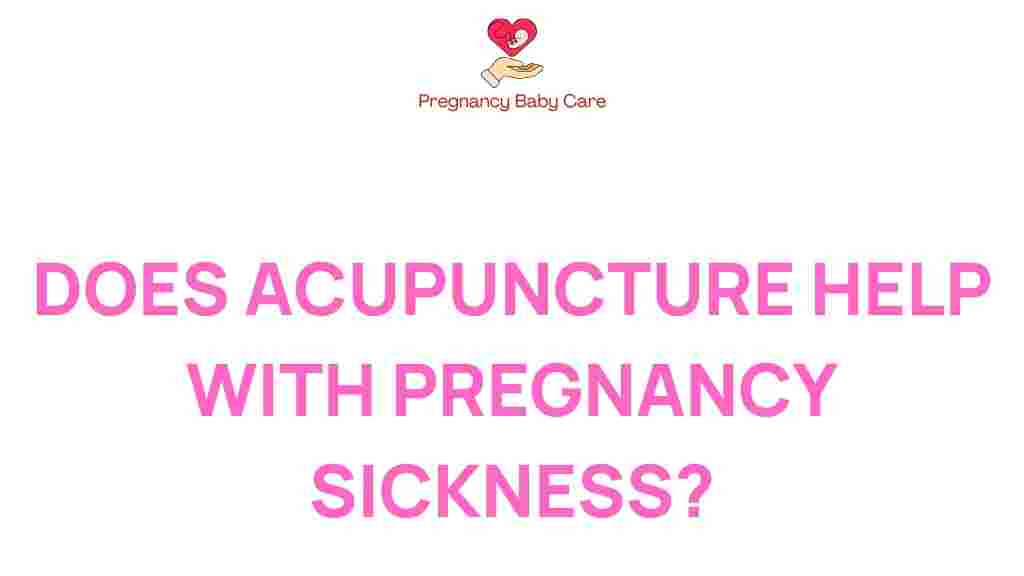Unraveling the Mystery: Can Acupuncture Alleviate Pregnancy Sickness?
Pregnancy is a beautiful journey, but it often comes with challenges, one of which is pregnancy sickness. Many women experience nausea, often referred to as morning sickness, during the first trimester. This condition can be debilitating, leading many to seek alternative therapies for relief. One such therapy that has gained popularity is acupuncture. In this article, we will delve into the relationship between acupuncture and pregnancy sickness, exploring its potential benefits, the process involved, and how it fits into the broader scope of holistic health and prenatal care.
Understanding Pregnancy Sickness
Pregnancy sickness, or morning sickness, affects up to 70-80% of pregnant women. It is characterized by nausea and vomiting, typically occurring in the first trimester but can extend into the second. While the exact cause of pregnancy sickness remains unknown, hormonal changes, particularly the rise of human chorionic gonadotropin (hCG) and estrogen, are believed to play a significant role.
Symptoms of pregnancy sickness can include:
- Nausea, particularly in the morning
- Vomiting
- Loss of appetite
- Fatigue
- Dehydration in severe cases
For many women, these symptoms can significantly impact their quality of life. Hence, finding effective nausea relief is crucial. This is where acupuncture may come into play.
What is Acupuncture?
Acupuncture is a traditional Chinese medicine practice that involves inserting thin needles into specific points on the body to promote healing and balance. It is rooted in the belief that energy, or “qi,” flows through pathways called meridians. By stimulating these points, acupuncture aims to restore balance and alleviate various health conditions, including pregnancy sickness.
How Acupuncture Can Help with Pregnancy Sickness
Research suggests that acupuncture can be beneficial for women experiencing pregnancy sickness. Here are some of the ways acupuncture may provide nausea relief:
- Regulating Hormones: Acupuncture may help balance hormone levels, potentially reducing the severity of nausea.
- Reducing Stress: The practice can promote relaxation and reduce stress, which may exacerbate feelings of nausea.
- Improving Digestion: Certain acupuncture points are believed to aid digestive function, alleviating symptoms associated with pregnancy sickness.
- Enhancing Blood Flow: Increased circulation may help improve overall well-being, which can positively impact nausea symptoms.
Step-by-Step Process of Acupuncture Treatment
If you’re considering acupuncture as a part of your prenatal care, here’s a general overview of what to expect:
- Consultation: Schedule an appointment with a licensed acupuncturist experienced in women’s health. Discuss your symptoms, medical history, and any concerns.
- Assessment: The acupuncturist will assess your condition, which may include checking your pulse and examining your tongue, both common practices in traditional Chinese medicine.
- Treatment Plan: Based on the assessment, the acupuncturist will create a personalized treatment plan that may include several sessions.
- Session: During the session, you will lie down comfortably, and the acupuncturist will insert thin needles into specific points. You may feel a slight pinch, but the process is generally painless.
- Duration: Sessions typically last 30 to 60 minutes, during which you may experience relaxation and a sense of well-being.
- Follow-Up: Regular follow-ups may be recommended to monitor progress and make adjustments to the treatment plan as necessary.
Safety and Considerations
While acupuncture is generally considered safe during pregnancy, it’s essential to ensure that you are treated by a licensed acupuncturist who specializes in prenatal care. Here are some safety tips:
- Choose a Qualified Practitioner: Ensure your acupuncturist is certified and has experience in treating pregnant women.
- Avoid Certain Points: Some acupuncture points are contraindicated during pregnancy. A qualified practitioner will know which points to avoid.
- Consult Your Healthcare Provider: Always discuss any alternative therapies with your obstetrician or midwife before starting treatment.
Troubleshooting Tips for Nausea Relief
In addition to acupuncture, several holistic health approaches can complement your efforts to alleviate pregnancy sickness:
- Dietary Changes: Eating small, frequent meals and avoiding greasy or spicy foods can help manage nausea.
- Stay Hydrated: Drink plenty of fluids, especially water, ginger tea, or electrolyte-rich drinks.
- Ginger: Ginger is known for its anti-nausea properties. Consider ginger tea, ginger candies, or supplements.
- Aromatherapy: Certain scents, such as lemon or peppermint, can help reduce feelings of nausea.
- Rest: Adequate rest and stress management techniques, such as yoga or meditation, can improve overall well-being.
Combining acupuncture with these strategies may enhance your ability to manage pregnancy sickness effectively. Remember, every woman’s experience is unique, and finding the right combination of treatments is essential.
Conclusion
Acupuncture presents a promising alternative therapy for women seeking relief from pregnancy sickness. As a holistic approach to wellness, it addresses not just the symptoms of nausea but also the overall balance of the body during this critical time. While scientific research continues to explore its efficacy, many women report positive experiences with acupuncture as part of their prenatal care.
If you are struggling with morning sickness, consider consulting with a qualified acupuncturist and discussing your options with your healthcare provider. With the right support and treatment plan, you can navigate the challenges of pregnancy with greater comfort and ease.
For additional information on holistic health and alternative therapies, you can visit this resource. If you’re interested in exploring more about women’s health, check out this link.
This article is in the category Pregnancy and created by PregnancyBabyCare Team
